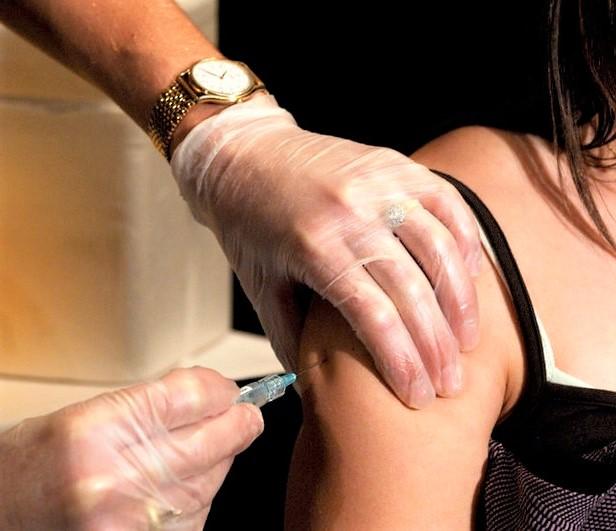The decision to authorize and approve a COVID-19 vaccine will be based on data and science—not politics, Stephen Hahn, MD, commissioner of the US Food and Drug Administration (FDA), said today in a Center for Infectious Disease Research and Policy (CIDRAP) webinar.
"We will use science and data to drive those decisions, we will be transparent about those decisions, and we will do everything in our power to prevent anything other than science and data from being involved in those decisions," Hahn said. "That is the promise that we as the FDA, that I as the commissioner of food and drugs, make to the American people."
The webinar, "The Review Process for Vaccines to Prevent COVID-19: A Discussion," also included former FDA Commissioner Margaret Hamburg, MD, and moderator Michael Osterholm, PhD, MPH, director of the University of Minnesota's CIDRAP, publisher of CIDRAP News.
The FDA has been clear about its criteria for vaccine authorization and approval and has created an open, public vaccine advisory committee to foster trust in its vaccine approval process, Hahn said. "None of us, including most importantly our career scientists, would want a vaccine approved or authorized that we wouldn't give to ourselves or our families," he said.
Hamburg said that transparency and rigor are critical for public acceptance and uptake of the vaccine. "We appreciate the urgency to get vitally needed products out there, and a vaccine in particular can really make a difference, but we also recognize that even if it is demonstrated to be safe and effective, if the public doesn't have trust and confidence in the vaccine and won't use it, it won't achieve our public health goals," she said.
Clear standards, criteria
Development of a COVID-19 vaccine has sped along much faster than the usual 10- to 15-year timeline, something that Hahn said was made possible by advances in molecular biology. "These allowed developers, manufacturers to understand the genetic sequence of the coronavirus and use it either with established platforms or newer technology to produce the vaccine candidates," he said.
The rapid development has been spurred by Operation Warp Speed, a partnership of the FDA, the US Centers for Disease Control and Prevention, the National Institutes of Health, the Biomedical Advanced Research and Development Authority, and the Department of Defense, in conjunction with private firms and other federal agencies, to accelerate development of a safe and effective COVID-19 vaccine.
Hamburg also attributed the accelerated vaccine development to partnerships between the FDA and the scientific community. "I want to underscore that another reason why I think that there has been an ability to move much more swiftly is that it's also about partnership," she said.
"And it's about the sort of elements of the vaccine research and development and review ecosystem all working together and really the importance, which is often forgotten, of the FDA not just as a bureaucratic regulatory body that says yay or nay to the final product but actually as a science-based public health agency."
The vaccine candidates will have to proceed through a well-designed, well-performed randomized, controlled phase 3 trial to qualify for either a biological use application or the shorter process of an emergency use authorization (EUA) from the FDA. At least 30,000 people will be needed to test the vaccine, and millions will be followed for adverse effects over time, Hahn said.
"Although the timelines to development have been compressed, there are no changes to our standards, and we have been very clear in our guidance, and I think this transparency is important—what will be our criteria for an emergency use authorization and what will be our criteria for safety and efficacy," he said.
Earlier this week, the FDA released more guidance on vaccine development. While an EUA is more flexible than a biological use application, it still involves a risk/benefit standard that is in some ways more stringent because the vaccine will not be used to cure people who are already sick but to prevent sickness in healthy people, Hahn said. And the vaccine will have to achieve a threshold efficacy of at least 50% in a phase 3 trial and prove safe after at least 2 months of follow-up.
"The decision will ultimately be determined by the scientists when we get the dataset," he said.
Diverse testing populations, need for multiple vaccines
Hahn added that, in addition to safety and efficacy, the vaccine must have been thoroughly tested in diverse populations, including people of different ethnicities and ages, pregnant women, and people with different underlying illnesses. "At the end of the day, in order for us to achieve our public health mission, the data we see and the decisions we make have to be representative of all Americans who could potentially receive a vaccine," he said.
Even if one vaccine were approved, placebo-controlled clinical trials should proceed, if it is ethical to do so, Hahn said. Hamburg agreed, saying "We are going to need more than one vaccine, ultimately, and I think that, you know, the reality is that the first vaccine over the finish line is not necessarily going to be the best vaccine in terms of our national and global needs," she said.
In closing, Hahn said, "Science will guide our decision, and I will not, and the FDA will not, allow pressure from anybody to change that. We plan to fight for science, we will fight for the integrity of the agency, we will always put the interest of the American people ahead of anything, and that includes personal considerations."
See also:
Oct 8 CIDRAP webinar on COVID-19 vaccines


















